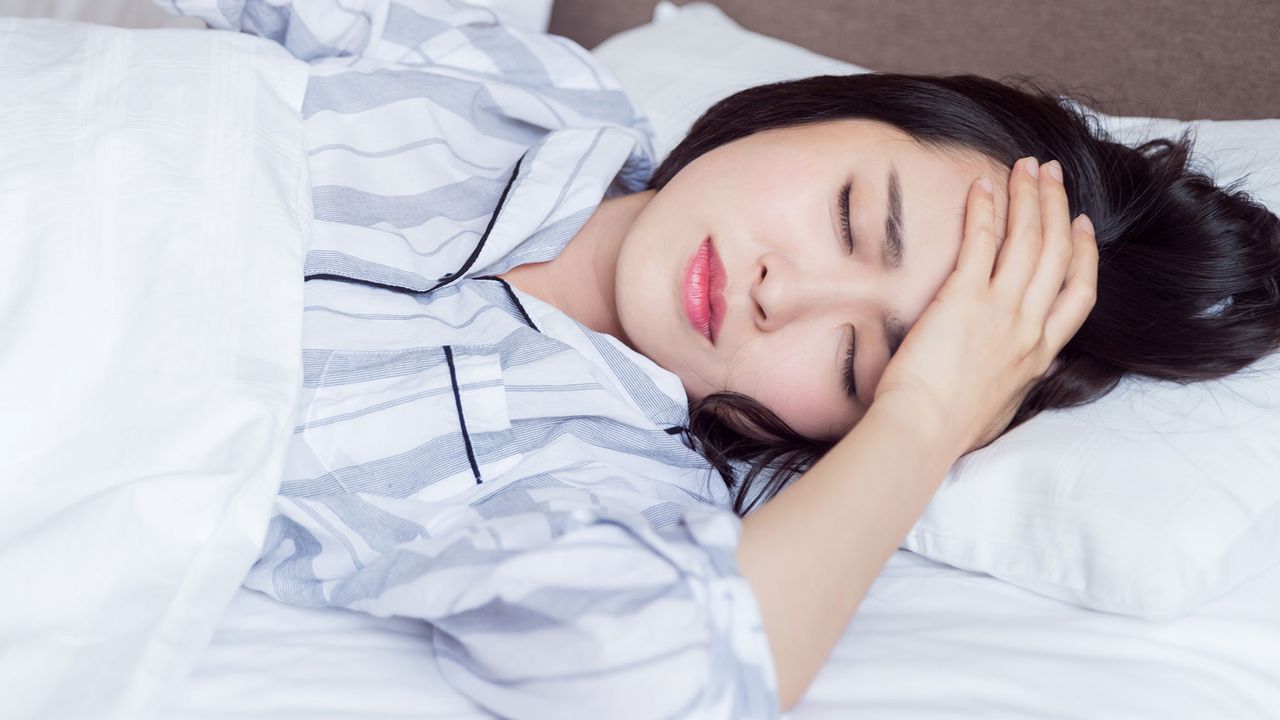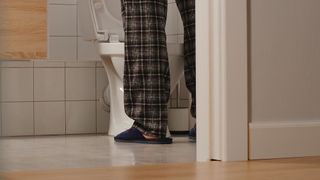7 common sleep problems that could signal underlying health issues
Your nocturnal habits - and in particular any sleep problems - reveal more about your health than you might imagine

Sleep problems are frustrating at the best of times, but some could hold the key to identifying wider health issues.
A bad night’s sleep may leave you feeling groggy and grumpy, but it could also be your body’s way of telling you that you need to cut down on salt, have your medicines tweaked, or ask your doctor for a blood test.
There are plenty of steps we can take to ensure a good night's sleep, such as investing in a comfortable mattress (or at least upgrading your current one with a mattress topper), blocking out light, and keeping the bedroom at an optimum temperature.
However, if you've taken all the necessary steps and still have trouble sleeping, then there could be something else going on.
In this article, we'll outline seven common sleep problems people typically experience, and examine their possible causes. These sleep problems are:
- Night sweats
- Snoring
- Acid reflux
- Nocturnal toilet trips
- Nightmares and night terrors
- Drifting, not sleeping
- Itching at night
If you or a loved one has experienced any of these issues, read on to discover what it might signify - and what action to consider taking.
Night sweats
Your age may make you suspect your sweaty nights are a sign of the menopause – and this may well be the case if your periods have dwindled or stopped, and you’re hot and sticky on even the coldest of nights, says Dr Riccardo Di Cuffa of Your Doctor.
Get the Fit&Well Newsletter
Start your week with achievable workout ideas, health tips and wellbeing advice in your inbox.
‘But night sweats can be a symptom of many different conditions your GP may want to investigate. For example, if combined with feeling stiff when you wake in the morning, they can be a symptom of polymyalgia rheumatica, which causes sore, inflamed muscles.’
Night sweats can also be caused by type 2 diabetes – along with other symptoms, such as excess thirst and peeing more frequently. Or, if you’ve been losing weight without trying, you could have an overactive thyroid gland.
What to do: Check it out with your doctor, who can run blood tests, according to your symptoms. If menopause is the cause, supplementation can help - see our list of the best menopause supplements for options that help to tackle night sweats.
Snoring
Take your partner’s complaints seriously – your snoring is not just an irritating noise, it could be a sign you need to lose weight.
Dr Di Cuffa says: ‘Excess fat around your neck pushes against your airways, narrowing them so you can’t breathe so silently – and hormonal and age-related changes to your muscle tone can exacerbate the problem. You may find you snore more if you’ve been drinking alcohol, and that’s because it relaxes your muscles.’
Snoring can also be a sign of a deviated nasal septum, enlarged tonsils, or a floppy uvula, and - if it’s really bad - you may need surgery to correct it.
But the time to really worry is if your partner notices a 10-second pause between snores, when you are not breathing at all. This is called sleep apnoea. It can cause you to be starved of oxygen and this puts a strain on your heart. Over time, this could put you at increased risk of a stroke.
What to do: Actions to take include losing weight, cutting down on alcohol, and seeing your doctor if your snoring is severe or you suspect you might have sleep apnoea.

Acid reflux
Sleep that’s disturbed by heartburn can simply be a sign you are eating too late at night, or that you need to cut back on spicy foods or fizzy drinks – and some people are prone to this virtually all their life.
Dr Di Cuffa says, ‘But if it becomes a new and persistent problem in your fifties and it’s not responding within a month to the usual antacid remedies from your pharmacy or doctor, or if the symptoms recur, your doctor should refer you for a camera investigation to check your stomach as you could have an ulcer, and to rule out more sinister causes.’
It’s also worth remembering that some people experience no heartburn but the acid causes them to wake up with a sore throat and they may also have a dry cough. This is also worth checking out with your doctor as the acid can irritate your gullet and this can be a risk factor for oesophageal cancer.
What do do: Avoid having late-night snacks and drinks, and sleep with the head end of your bed raised. If you’re still having problems, then see your doctor.
Nocturnal toilet trips
Don’t dismiss them – they could be a sign you have too much salt in your diet, says Dr Sally Norton. ‘That matters because it is a risk factor for high blood pressure and potential stroke – or it could be a sign of diabetes, which causes more frequent urination day and night.’
A weak pelvic floor in women or a urine infection could also cause you to wake for the loo, and some medicines can have this effect, too.
What to do:
- For women, start or keep up with pelvic-floor exercises;
- Consume no more than 2,400 mg sodium (6g salt) in a day;
- Talk to your doctor about any medications you’re taking;
- Get tested for diabetes and underlying infections.

Nightmares and night terrors
Though you may imagine your nightmares are a sign you’re secretly stressed, the truth is that you’re just more likely to remember a bad dream than you would a dull, non-event of a dream, explains independent sleep expert Dr Neil Stanley.
‘We each have about five dreams a night during our REM sleep. This is the phase during which you will wake if you need the loo, or if you wake naturally in the morning without an alarm clock, and it is only if you wake during one of these nightmares that you will remember it.
'We do not recall dreams we do not wake in. Freud noted that depressed people reported more nightmares, but that was because they were depressed and therefore focused on the negatives – it wasn’t their depression that caused their nightmares.
‘Night terrors – in which people scream in terror in their sleep – are different from nightmares. They occur in our deepest sleep, and we have no memory of them, even if we are woken during one.
'During this phase of sleep, the conscious part of the brain is asleep but other parts of the brain may awaken. If the part of your brain that controls walking awakes, you will walk in your sleep. If the talking part awakes, you will talk.
'With a night terror, the part that experiences fear awakes – and you may start to scream, even though you are unaware of it. It is not a sign of underlying stress or fear, but both nightmares and night terrors are more likely if your sleep is too light – and being stressed can cause you to sleep lightly, so this is something to check out.’
What to do: Don’t worry – you don’t have an underlying condition, but you may need to try relaxation techniques to reduce stress and deepen your sleep cycle. Check out our guide on how to meditate for tips on pre-sleep relaxation, and also consider using an essential oil diffuser to infuse your bedroom with relaxing scents such as lavender.
Drifting, not sleeping
Your body needs melatonin in order to sleep soundly, and drifting is a sign you’re not getting enough.
‘You need complete darkness to create this sleep hormone, but you also need enough tryptophan (an amino acid in your diet) to boost your levels,’ explains Dr Craig Hudson, a psychiatrist and author of Feel Great Day & Night: A Natural Approach To Treating Insomnia.
‘On top of that, remember to observe all the usual ‘sleep hygiene’ rules – keeping your bedroom at 64-70°F (18-21°C) overnight, and writing down your worries so they don’t keep you awake.’
What to do:
- Use a blackout mask;
- Practice relaxation techniques;
- Consume a tryptophan-rich snack or drink, such as a banana, glass of milk or a handful of walnuts, before bed.
Itching at night
Overheating can cause itching during the night, or it could simply be that you are allergic to the laundry detergent you’ve used to wash your bedsheets.
However, other possibilities could include side effects of medicines, or even a liver problem (especially if your eyes are showing signs of yellowing, caused by jaundice).
What to do: If you’ve ruled out allergies and a cooler bed isn’t helping, check this out with your doctor.
Launched in 2020, Fit&Well.com is all about helping you meet your health and fitness goals in ways that are fun and achievable. With news and features on fitness, weight loss, running, nutrition, yoga, wellness and more, we're committed to helping you wherever you are on your fitness journey. We break down the best fitness tech, with reviews, buying guides and the latest deals on fitness and wellness kit, from dumbbells to diffusers.
We cater for all difficulty levels here. It doesn't matter if you're a beginner in the world of fitness or you're gearing up for your tenth marathon: we're all moving towards the same goal – creating a healthier, happier you. From guides on getting started doing walks around the block, to creating the perfect work-from-home space, to eating to fuel your first triathlon. It's all here.
-
 A personal trainer says "you’ll never do sit-ups again" after trying these five exercises
A personal trainer says "you’ll never do sit-ups again" after trying these five exercisesWorkout I tried her recommended moves—here’s what I thought
By Jennifer Rizzuto Published
-
 This small Pilates tool can tone your entire body—here’s how to use it
This small Pilates tool can tone your entire body—here’s how to use itPilates Small, affordable and surprisingly effective
By Jennifer Rizzuto Published

